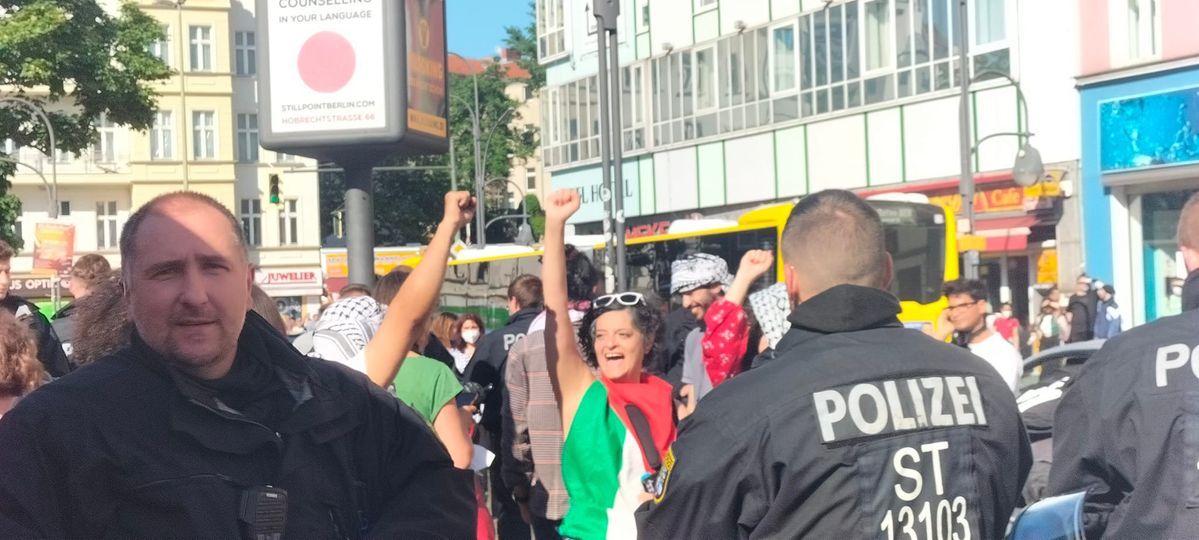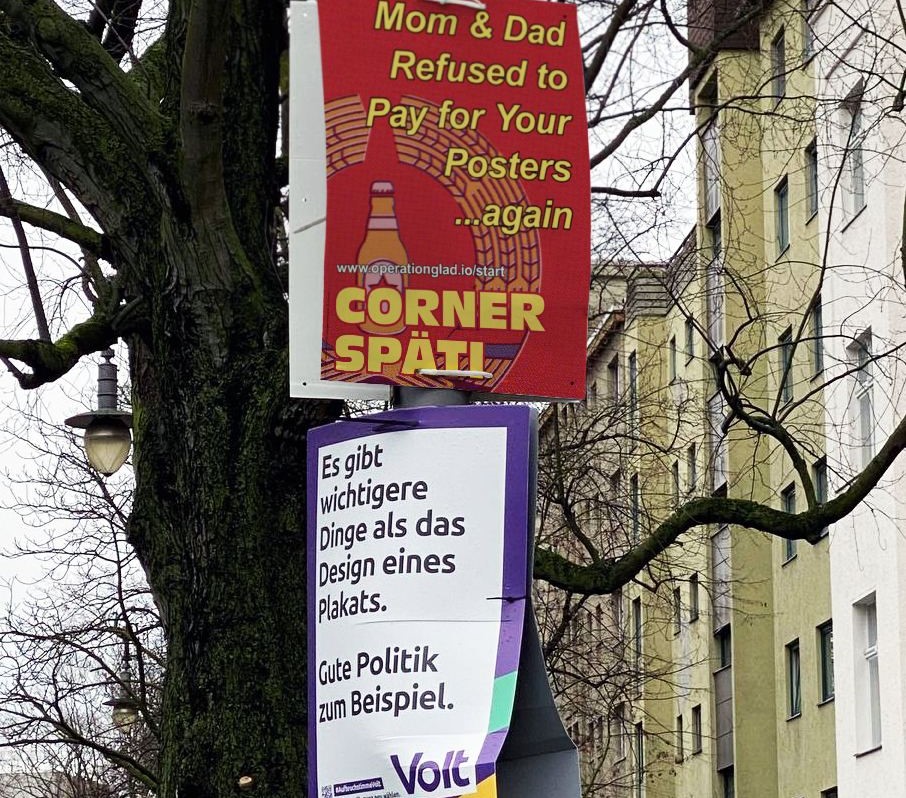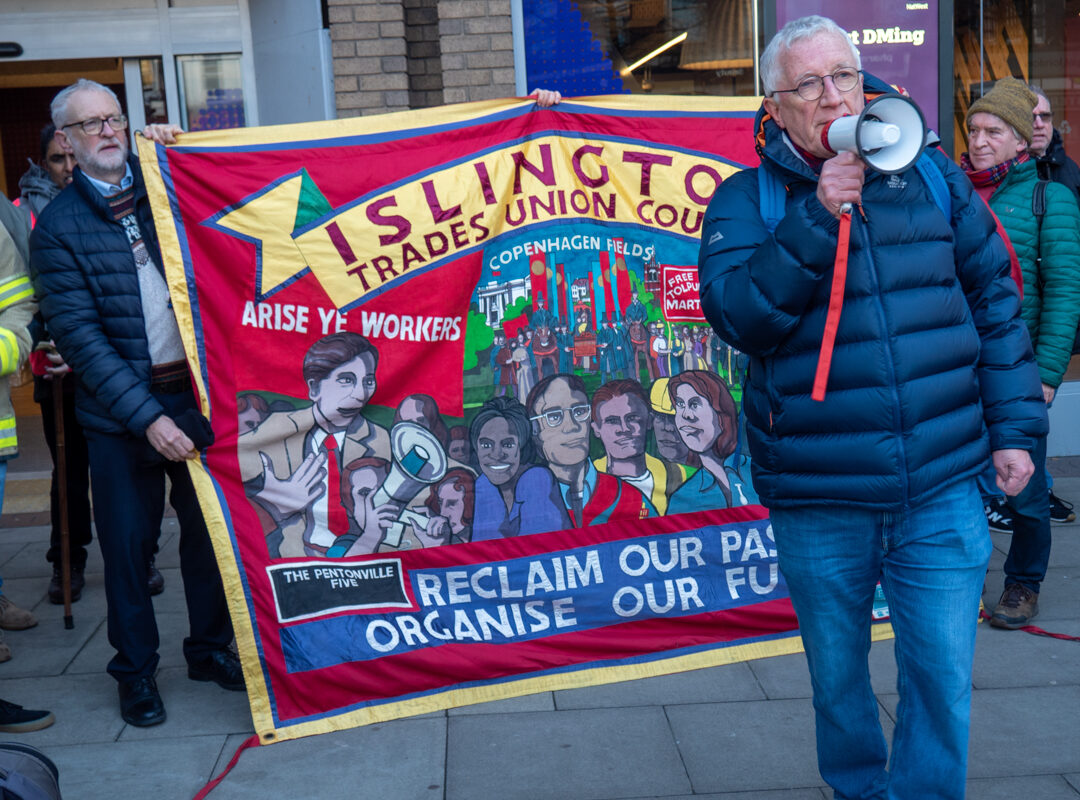I need you to cast your mind back to Spring of 2019, the days are warming up and the world has proven that they are ready for the seamless blend of rap and country music, but a far less significant event than Lil Nas X’s “Old Town Road” was underway. That’s right, the 2019 EU elections. A very important event that I’m sure everyone remembers and cares about. Ignoring the results for now, there was something about the campaign, the Wahlkampf, that people here in Berlin noticed. A new small party called Volt got their posters up in every district early, even before many of the major German parties. The posters were royal purple references to other cities and countries in the EU, printed well and in full colour. Appealing to some people but for those with the ability to think for more than five minutes it was suspicious.
Germany is a country where there are effectively only six parties, and smaller parties are starved for resources. This is especially true for new parties who haven’t had the chance to meet electoral criteria that grant them state funding. New parties in Germany tend to rely on cheaper printing methods, mostly white posters to save money on ink and even then they will lack the money to print multiple designs and to print enough to cover every neighbourhood in Germany’s capital. So how could Volt afford this? What was going on? Surely everyone was thinking this, this couldn’t be the mad internal monologue of someone scarred by having to pay for their own printing costs while doing a graphic design degree. Nope, I’m definitely normal. Let me prove how fucking normal I am by writing about how I went down a rabbit hole and became The Foremost Expert on Volt™.
WIE IN WIEN?
Did I mention I have a podcast? I’m one of society’s heroes, the marxist ideal of a worker because I giggle and fart into a mic for two hours every week with my friends. You’re welcome. Anyway, I bring this up because, shortly after the 2019 EU election we did an episode on Volt where I go into an absurd amount of detail about this party. That was the joke. At the moment of recording there was a revolution occurring in Sudan, a general strike in Brazil and an uptick in anti-Muslim attacks in India but we, as a group of goofballs, decided to do an episode on a party that got one MEP. However it wasn’t until various state elections and the 2021 federal German election were on the horizon that we knew that Volt would become a regularly occurring character on the show. People would regularly post that they didn’t know who to vote for and when someone mentioned Volt our episode would get linked to, it turns out that we were the only people to ever report on them beyond a puff piece that would gawk out how young they were (for politics, not like objectively). This upset members of Volt online and they would try to debate us on Twitter, making an all too common German Liberal mistake which is thinking Twitter is the Greek agora-like free exchange of ideas rather than what it really is which is a place to make jokes, bully Elon Musk and post pictures of pregnant Sonic photoshopped into a Subway ad. Congratulations Sonic, I will Eat Fresh.
Through researching for the few episodes we’ve done on them and through their angry responses (which to be fair, I was asking for) I’ve learnt far more than I care to about Volt. On their own terms, Volt is a “Pan-European, Progressive and Pragmatic” political party that attempts to run in multiple European countries with the ultimate stated aim of creating a federal Europe. Founded in 2017 in response to Brexit, populism (vaguely defined of course) and to a lesser extent Trump by three former McKinsey & Co employees. Italian Andrea Venzon, the boyfriend of French co-founder Colombe Cahen-Salvador and finally German co-founder Damian (Hieronymus Johannes Freiherr von Boeselager). The name Volt was picked because it’s a word in all European languages (they were originally gonna be called Vox but em, whoops). Damien was elected in Germany to the European Parliament in 2019 while Andrea and Colombe failed to meet the bureaucratic/financial requirements for Volt to run in Italy and France for the 2019 EU Elections. After these elections and after Andrea loses an internal Volt leadership vote to Damien, Andrea and Colombe would quietly leave to go on and to found Atlas Movement (where you see Andrea and Colombe dead-eyed in a zoom call with such political winners as Juan Guaido). Since then, Volt has enjoyed electoral successes in local and municipal elections in western Germany, they rode the coattails of other parties into the Bulgarian parliament and got three MPs into the Dutch parliament, their biggest success of all.
So what policy positions do they advocate for? They said progressive in their promotional material and they talk about Europe a lot, which most people just assume without explanation that that is good, in and of itself. Well, advocating for a federal Europe is one policy I guess but that’s probably (probably) not happening anytime soon and frankly I’m not sure I care too much about the size and shape of the government I live under as much as I care about what that government does. Like the size of Singapore doesn’t matter too much if you personally just love chewing gum.
Initially, they were a little vague, in fact I encountered the lovely little Dutch term “vaaglinks” used to describe Volt. The Volt website talked of their “5 +1 challenges,” a collection of platitudes arranged under the titles of “Smart State, Economic Renaissance, Social Equality, Global Balance, Citizen Empowerment and EU Reform.” I can disagree with these things as much as I can grasp the air around me. It was all very 90s, very ‘Blairism without the Labour Party.’
When they started running in various elections they were forced to make their position clearer on certain issues. As a young party that centres technology as a solution for political issues they have a tendency to fill in things like Voteswiper and Wahlomat with gusto. Here is where we arrive at the policy positions that have earned them the title in Germany of ‘Lila JuLi’ (Purple version of the FDP’s youth wing). Opposing the reintroduction of the wealth tax in Germany, being opposed to rent caps, being in favour of police conducting random spot checks in “dangerous areas” and not being opposed to the debt brake. In the Netherlands we similarly see bizarre policy positions for a party calling itself progressive such as opposing equal pay for primary school teachers and secondary school teachers, opposing the construction of social housing to alleviate the Dutch property crisis and, in a very 90s move, advocating for carbon credits as your climate strategy. Which is wild for the Netherlands, a country that could be underwater by the time you are reading this.
However, in the 2019 EU elections we seem to see progressive policy being presented in their “Wie in [EU country/city]” poster campaign. The idea is simple, what if we take a policy from one EU country and put it in another. Seems great, if I blindly assume all other EU countries are good and that Volt have gone and selected the ones that are the most progressive. Well…
One example of this is Vienna’s “one euro per day” public transport scheme. The €365 yearly ticket, which Volt is in favour of implementing in various comparable EU cities. But… eh… Tallinn has free public transport for all residents. Can we do that instead? No. That wouldn’t be Pragmatic would it? Can’t have nice things all the time can we? I have enjoyed their newest poster campaign in the Berlin elections which smugly states, “There are more important things than poster design. Good politics for example.” I especially enjoy it when it’s above an SPD poster advocating for a public transport ticket that undercuts their proposal by €17 per year.
To be fair the “one euro per day” ticket was not on the posters, but “Wie in Wien” was the title of their poster that alluded to Volt’s housing policy. This arrives at the issues with Volt’s transplanting of policies from one nation to another. The legacy of Red Vienna’s housing policy in the interwar period is exactly that, a legacy. It has resulted in a sizable portion of Austria’s capital city living in government owned or rent controlled apartments with little to no social stigma that you might expect in other countries but it is a product of a particular history that occurs in a particular place. To recreate that moment would at least require a government to “enteignen” a lot of private property to make it happen, but Volt is very opposed to DWcE. So we must assume they are for the other conditions that allowed Red Vienna’s housing policy to occur. A global stock market crash and a world war.
SO HOW’D THEY PRINT THOSE POSTERS?
So glad you asked, me from six words ago.
Volt originally advertised itself as being funded by “small donations and crowdfunding” and they have always championed transparency as a core tenant. This is true but the language was always a little misleading. Using the terms like “progressive” and “small donations” evoked similar campaigns we were seeing at the time in the USA (Sanders/Ocasio-Cortez in particular). The issue being that these campaigns did two things that Volt did not,
- impose an upper limit on donations and
- refuse corporate donations.
This was a criticism first put forward in the Volt Ask Me Anything done on the Dutch subreddit. The Volt team did not respond.
The crowdfunding campaigns are a little embarrassing. Volt ran 17 fundraising campaigns on the website GoFundMe, which is like Kickstarter but it allows you to do political fundraising and you can keep all the donations even if you don’t reach your stated goal which only happened once for Volt. On average, Volt only managed to raise 33% of the stated goals across these 17 campaigns. On the campaigns where donors are listed we can see other members of Volt making donations to the campaign and in one instance, the fundraiser for the Amsterdam assembly (where the manifesto was voted on), the average donation was €225. At this point I should say the USA has a limit of $100 donations for most political campaigns and as a country they’re famously known for not having money influence their politics.
The transparency claim is also one that is a little misleading. Volt does in fact list everyone who has made a donation of any amount over €3000, just not in the one place. Since Volt Deutschland, Volt Italia, Volt Netherlands, Volt Europa etc etc are all separate entities you have to visit each one’s individual website and find the donations page (Google Translate plugin switched the fuck on). As an example, only by visiting the German and European website can you see that Christian Oldendorff (of Oldendorff Carriers, a shipping company based in Hamburg) has donated over €100,000 to Volt.
However, this only works if you can still visit the donations page. Andrea Venzon seems to have taken the Italian donor network with him when he left Volt because all major donations to Volt Italia stopped at that point and the donations page was delisted, replaced with a crowdfunding platform exclusively for the Italian wing of the party. You can still see the big donations to the Italian branch but only if you know the URL and use the Wayback Machine. Donors to the Italian wing included directors from LVMH and members of the Agnelli Family just so you know.
Then the donations themselves are not super transparent, more than once do you have an individual making a sizable donation and then later making another sizable donation through a company they own, this is not marked or noted on Volt’s donations page. Nor is any relationship disclosed. The agency who designed Volt’s brand identity donated about €9,000 to the German branch in 2020 and several large donors listed are the parents of people running on Volt’s ticket.
THE EURO GENERATION
For all the puff pieces, ARTE documentaries and other attempts to portray Volt as young and hip they sure do seem to love posting a lot of embarrassing shit without any sense of how it might be seen as “cringe” or “peinlich.” Whether it’s their series of Volt candidate trading cards or announcing their Berlin manifesto as slam poetry. While funny, it helps paint a picture of entitled kids with no self awareness. Maybe this was obvious from the get-go to a lot of you, maybe you immediately saw the nice posters pop up out of nowhere and it immediately clicked for you. Maybe you rightfully assumed that any sense of “Europeanness” is only really possible for those who have the means to regularly travel and or are employed in an email job that hires from all over the continent.
The term “erasmus generation” gets thrown around a lot, describing a generation for which the EU existing as it does now is the norm. This would include myself, born in Ireland, 1990, a founding member of the euro and often topping the opinion polls as “most pro-EU country” (sometimes Romania beats us). Using the term erasmus is a little too erudite for my liking though. Erasmus implies travelling, museums, cultural landmarks, multilingualism and learning and that’s not really what’s happening here.
Despite the reality that what erasmus really is is mostly just college kids hooking up being largely facilitated by not speaking each other’s languages, I think what really defines this group, in two ways, is the euro. With the exception of Bulgaria, Volt’s electoral success maps perfectly onto the winners of the EU. Mostly North Western Europe, mostly within the countries known for being most opposed to intra-EU financial aid. Even within Germany, Volt has not been successful in the east of the country. The Linkedin accounts of those in charge of Volt Netherlands look like the google search results for ‘banks in Amsterdam’ and same goes for their parents and donors. But what separates them from their parents is, like me, they have only ever been paid in euros (just a lot more than me). Maybe you remember the mark or guilder as the currency of pocket money or buying sweets when you were young, but every wage you’ve received was in euro. You remember the switch over too, you remember the little calculators and coin collecting booklets, it was a big deal. Something was happening, change was coming but now, 20 years later that change hasn’t come and rather than deal with questions like, “well then what the fuck are we even doing then? What is the EU even for?” that the rest of us have to deal with, Volters simply say, “well surely I or my parents have enough money to make the change come.”




